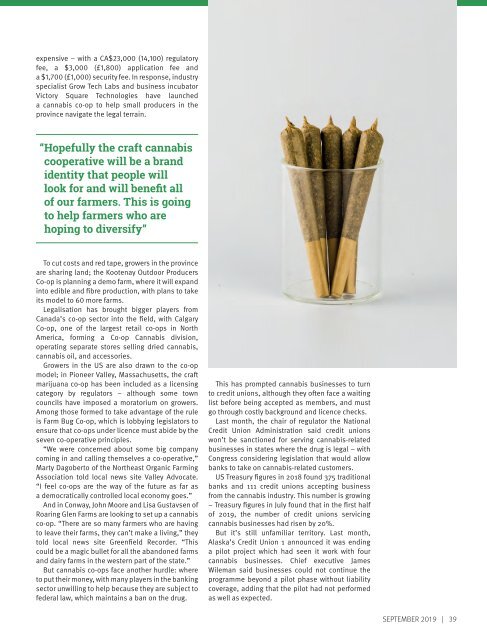Co-op News September 2019: Agriculture
How are co-ops working agriculture?
How are co-ops working agriculture?
You also want an ePaper? Increase the reach of your titles
YUMPU automatically turns print PDFs into web optimized ePapers that Google loves.
expensive – with a CA$23,000 (14,100) regulatory<br />
fee, a $3,000 (£1,800) application fee and<br />
a $1,700 (£1,000) security fee. In response, industry<br />
specialist Grow Tech Labs and business incubator<br />
Victory Square Technologies have launched<br />
a cannabis co-<strong>op</strong> to help small producers in the<br />
province navigate the legal terrain.<br />
“H<strong>op</strong>efully the craft cannabis<br />
co<strong>op</strong>erative will be a brand<br />
identity that pe<strong>op</strong>le will<br />
look for and will benefit all<br />
of our farmers. This is going<br />
to help farmers who are<br />
h<strong>op</strong>ing to diversify”<br />
To cut costs and red tape, growers in the province<br />
are sharing land; the Kootenay Outdoor Producers<br />
<strong>Co</strong>-<strong>op</strong> is planning a demo farm, where it will expand<br />
into edible and fibre production, with plans to take<br />
its model to 60 more farms.<br />
Legalisation has brought bigger players from<br />
Canada’s co-<strong>op</strong> sector into the field, with Calgary<br />
<strong>Co</strong>-<strong>op</strong>, one of the largest retail co-<strong>op</strong>s in North<br />
America, forming a <strong>Co</strong>-<strong>op</strong> Cannabis division,<br />
<strong>op</strong>erating separate stores selling dried cannabis,<br />
cannabis oil, and accessories.<br />
Growers in the US are also drawn to the co-<strong>op</strong><br />
model; in Pioneer Valley, Massachusetts, the craft<br />
marijuana co-<strong>op</strong> has been included as a licensing<br />
category by regulators – although some town<br />
councils have imposed a moratorium on growers.<br />
Among those formed to take advantage of the rule<br />
is Farm Bug <strong>Co</strong>-<strong>op</strong>, which is lobbying legislators to<br />
ensure that co-<strong>op</strong>s under licence must abide by the<br />
seven co-<strong>op</strong>erative principles.<br />
“We were concerned about some big company<br />
coming in and calling themselves a co-<strong>op</strong>erative,”<br />
Marty Dagoberto of the Northeast Organic Farming<br />
Association told local news site Valley Advocate.<br />
“I feel co-<strong>op</strong>s are the way of the future as far as<br />
a democratically controlled local economy goes.”<br />
And in <strong>Co</strong>nway, John Moore and Lisa Gustavsen of<br />
Roaring Glen Farms are looking to set up a cannabis<br />
co-<strong>op</strong>. “There are so many farmers who are having<br />
to leave their farms, they can’t make a living,” they<br />
told local news site Greenfield Recorder. “This<br />
could be a magic bullet for all the abandoned farms<br />
and dairy farms in the western part of the state.”<br />
But cannabis co-<strong>op</strong>s face another hurdle: where<br />
to put their money, with many players in the banking<br />
sector unwilling to help because they are subject to<br />
federal law, which maintains a ban on the drug.<br />
This has prompted cannabis businesses to turn<br />
to credit unions, although they often face a waiting<br />
list before being accepted as members, and must<br />
go through costly background and licence checks.<br />
Last month, the chair of regulator the National<br />
Credit Union Administration said credit unions<br />
won’t be sanctioned for serving cannabis-related<br />
businesses in states where the drug is legal – with<br />
<strong>Co</strong>ngress considering legislation that would allow<br />
banks to take on cannabis-related customers.<br />
US Treasury figures in 2018 found 375 traditional<br />
banks and 111 credit unions accepting business<br />
from the cannabis industry. This number is growing<br />
– Treasury figures in July found that in the first half<br />
of <strong>2019</strong>, the number of credit unions servicing<br />
cannabis businesses had risen by 20%.<br />
But it’s still unfamiliar territory. Last month,<br />
Alaska’s Credit Union 1 announced it was ending<br />
a pilot project which had seen it work with four<br />
cannabis businesses. Chief executive James<br />
Wileman said businesses could not continue the<br />
programme beyond a pilot phase without liability<br />
coverage, adding that the pilot had not performed<br />
as well as expected.<br />
SEPTEMBER <strong>2019</strong> | 39


















